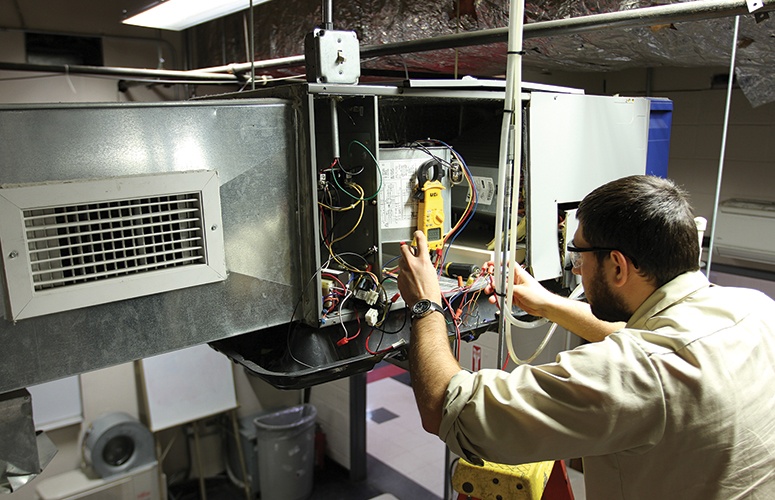
Bridging the Skills Gap
Government, trades, educators and organizations support training and apprenticeship programs to boost workplace preparedness.
By Vince Baglivo, Contributing Writer On May 4, 2019Employers in the Garden State are having a hard time finding skilled workers to fill critical positions in areas ranging from construction to electronics, manufacturing and more. Some blame current low unemployment rates. An aging workforce in certain sectors is compounded by a lack of interest among potential younger employees. Others note an emphasis on a college education over vocational training. Changes in required skill sets, driven by ever-advancing technology, adds to the problem.
Yet a coalition of forces, including elected officials, trade organizations, the state’s educational community and both for-profit and non-profit organizations have found inspiration in Gov. Phil Murphy’s support for apprenticeship and training programs. Individually and collectively, they are contributing to critical efforts to address this challenge to the state’s economic health and growth.
Gov. Murphy announced plans in 2018 to create the New Jersey Apprenticeship Network, a new path for state residents to enter high-skilled careers through paid apprenticeships that may include college credit.
The state’s budget for Fiscal Year 2019 earmarked $10 million to support the New Jersey Apprenticeship Network, including training programs provided by organized labor, as well as new initiatives with industry and corporate partners.
Funding for the New Jersey Apprenticeship Network comes from the Workforce Development Partnership Program (WDPP) and is administered by the Department of Labor and Workforce Development. The governor’s budget also included $34.5 million in WDPP funds for new and expanded programs.
In February, Gov. Murphy announced grant awards totaling $2.8 million to seven New Jersey businesses and higher education institutions for training programs that will employ 480 new apprentices within the next 12 months and start them on a new career path.
Funding comes from the NJ Department of Labor and Workforce Development’s Growing Apprenticeship in Nontraditional Sectors (GAINS) competitive grant, which was announced last fall. The GAINS program promotes the creation and expansion of US Labor Department-approved Registered Apprenticeship programs that drive economic development through skills and educational attainment and create paths to better-paying careers and advanced industry credentials. The grant program also promotes diversity in Registered Apprenticeship programs by encouraging the hiring of underrepresented groups such as veterans, people with disabilities, and ex-criminal offenders.
The grant funds support a diverse range of programs. They are designed to promote economic growth by building experience in high-demand industry sectors such as advanced manufacturing, information technology, software development, clean energy and utilities, healthcare and more.
The grant recipients will begin or expand apprenticeship programs to train machinists, skilled tradesmen, auto technicians, tool & die makers, medical and lab techs, chemical techs, human resources staff, and others. Apprentices will earn at least $15 per hour.
At the time of the announcement, Gov. Murphy said that “our vision for a stronger and fairer New Jersey starts with workforce development. With these investments, we are providing residents of New Jersey with the necessary skills and training they need for good-paying jobs that will help move our economy forward.”
Secretary of Higher Education Zakiya Smith Ellis added that “Apprenticeship and a college degree are often viewed as separate career tracks, but they’re really complementary. College students need workplace experiences before graduation, and apprentices gain from classroom instruction in subjects that reinforce what they learn on the job.”
The largest grant, totaling nearly $1 million, was awarded to the New Jersey Community College Consortium for Workforce & Economic Development (NJCCC), and will support apprenticeships for machine operators, machinists, mechatronics technicians, production technicians and workforce development analysts.
Founded in 2004, the Consortium helps bridge the skills gap for employers, their employees and job seekers with the support of the NJ Council of County Colleges. Bringing together the vast workforce training resources of the state’s 19 community college council members under one roof makes it easy for companies to access workers participating in more than 1,700 training programs taught by highly qualified faculty with business and industry experience.
“The apprenticeships are not just for building trades,” NJCCC CEO Sivaraman Anbarasan points out. “Every industry is covered including financial services, information technology and healthcare.”
Scott Shaw, CEO of Lincoln Tech, says he appreciates the growing dialogue regarding apprenticeships. With campuses in Iselin, Mahwah, Moorestown, Paramus, South Plainfield and Union, Lincoln Tech offers diploma, degree and certificate programs for careers across a wide range of industries.
“Not everyone can or will go to college, although many apprentices go on to earn college degrees,” Shaw notes. “At Lincoln Tech, our students receive a hands-on education taught by industry pros and learn direct application skills. There is such a need for people with mechanical skills, who work with their hands,” Shaw continues. “At the same time, employees also require more advanced technical abilities; it’s an interesting and challenging time for employers and employees.”
Bernie Corrigan, president, IBEW Local 102, says while a great amount of training is offered at his organization’s 16,000-square-foot facility in Parsippany, which features state-of-the-art classrooms and labs and rooms outfitted to replicate the tasks encountered on the job including pipe bending, solar, fire alarm, splicing, tele-data/fiber optic and instrumentation, there are limits to what can be provided.
“This is why we implemented our tuition reimbursement program; the willingness of our organization to offer up to 75 percent reimbursement of tuition costs has opened the doors to multiple opportunities for our members,” Corrigan adds. “We’ve seen the program utilized for college degrees, certificates in welding or crane operator, commercial driver’s license, and project management programs – the list goes on. We have basically provided a springboard to job opportunities, the chance to make yourself more employable.”
One of IBEW Local 102’s newest partners is Rowan University. Through this collaboration, an agreement is in place that offers a BA in Construction Management. The program awards 53 college credits for apprentice related coursework. It is also fully online, which suits the needs of the local’s members. Corrigan is looking forward to seeing the first graduates of the program in the upcoming year.
“The building trades have always had well established apprenticeship programs. I applaud the efforts of the current administration – the drive toward a model of apprenticeships in nontraditional sectors may help stem the outmigration of quality graduates that leave New Jersey every day,” Corrigan concludes. “We need to take steps to strengthen partnerships between businesses and higher education and build alliances that will create pathways to careers.”
To access more business news, visit NJB News Now.
Related Articles:





